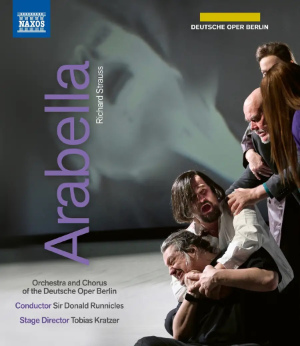
Richard Strauss (1864-1949)
Arabella, lyric comedy in three acts, Op.79 (1933)
Count Waldner – Albert Pesendorfer (bass)
Adelaide – Doris Soffel (mezzo-soprano)
Arabella – Sara Jakubiak (soprano)
Zdenka – Elena Tsallagova (soprano)
Mandryka – Russell Braun (baritone)
Matteo – Robert Watson (tenor)
Berlin Deutsche Opera Ballet, Chorus and Orchestra/Donald Runnicles
Tobias Kratzer (stage direction)
rec. live, 18 & 23 March 2023, Deutsche Oper Berlin, Germany
Naxos NBD0182V Blu-ray [160]
When Hugo von Hofmannsthal died in 1929, he left a fully revised text only of the first of the three actsof Arabella. So, Richard Strauss could not complete the opera in collaboration with his librettist, as they had in their five previous operas. He left the texts largely alone out of respect for his colleague. As a result, the libretto has often been found wanting, but the music is graceful enough for the work to keep a place in the repertory, if not quite a central one. Its quality ensures it comes around more often than their previous opera together, Die ägyptische Helene.
This comic opera is set in Vienna in the 1860s.The impecunious Count Waldner and his wife Adelaideneed a wealthy marriage for their older daughter Arabella. To avoid having to find a dowry for their younger daughter Zdenka, they disguise her as “Zdenko”, a boy. She secretly loves Matteo, who is courting Arabella but sees Zdenko as a friend. After the expected confusions and complications of this rom-com before its time, Arabella is united with the wealthy Mandryka, and Zdenka with Matteo.
The staging for Act One divides the set down the middle: on the left, the Waldners’ hotel accommodation, on the right either the sisters’ bedroom or the hotel lobby. A half space is sometimes occupied by black-and-white film related to the scene on the other side. For example, the opening card game on the left has film close-ups of the card table on the right. Photographers visibly wander the stage, taking pictures or filming the action, which at times is a little intrusive. In a long interview in the booklet, director Tobias Kratzer explains coherently enough the role of the film technology in Acts One and Three in his production.
Act Two depicts a ball but Kratzer sets it in the corridor outside the ballroom. The characters come and go from the invisible ballroom as the plot requires, so the whole action occurs at the front of the stage. These frequent exits and entrances enable costume changes which move the setting forward in history. We arrive, via the 1920s and 1930s, at the present day, signalled by a mobile phone: a metaphor, perhaps, for the unchanging nature of love and the obstacles it faces in every era.
Act Threereturns to the occasional use of video, especially at the outset when an intimate scene is shown as the prelude. Most characters are dressed in modern black attire against a black background and pale floor rather than a set. The focus now is on character and plot. The final scene with Arabella’s symbolic glass of water concludes with a playful water fight.
Sara Jakubiak is excellent in the title role. She has a Wagnerian voice in the best sense (she sings Isolde, Elsa and Sieglinde), so has the lyricism and phrasing for Arabella. She is fine all along, and specially in her closing duet. Her Act One duet showcases her qualities and those of Elena Tsallagova’s vocally superb Zdenka, who convincingly enough acts as Zdenko.
Russell Braun sings well, and is persuasive in the Act Two confusions which beset Mandryka. Tenor Robert Watson’s Matteo is very good too, especially in the opening scene of Act Three. All the supporting roles are, at the least, adequate. Donald Runnicles, a seasoned Straussian, gets a fine response from his orchestra, while always ensuring that the balance allows us to hear the singers clearly. The Blu-ray surround sound is fine, as is the picture and the film direction. The director’s interview in the booklet is helpful.
I have not seen other versions on film, but the MWI review of the DVD version lists reviews of other Arabella productions on DVD, conducted by Haitink, Thielemann and Solti. The work has not lacked the attention of leading opera conductors.
Roy Westbrook
Previous review (DVD): Stephen Barber (April 2025)
Buying this recording via a link below generates revenue for MWI, which helps the site remain free



Other cast
Count Elemer – Thomas Blondelle (tenor)
Count Dominik – Kyle Miller (baritone)
Count Lamoral – Tyler Zimmerman (bass-baritone)
Fiakermilli – Hye-Young Moon (soprano)
A Fortune Teller – Alexandra Hutton (soprano)
Welko – Jorg Schorner (tenor)
Djura – Michael Jamak (actor)
Jankel – Robert Hebenstreit (actor)
Waiter – Thaisen Rusch (tenor)
Other production staff
Jeremy Bines, chorus master
Rainer Sellmaier, set and costume designer
Clara Hertel, costume designer
Stefan Woinke, lighting designer
Jeroen Verbruggen, choreographer
Technical details
Picture format: NTSC 16:9
Sound format: Dolby Digital 2.0 / DTS 5.1
Region code: 0 (worldwide)
Audio language: German
Subtitles: German, English, French, Japanese, Korean

















